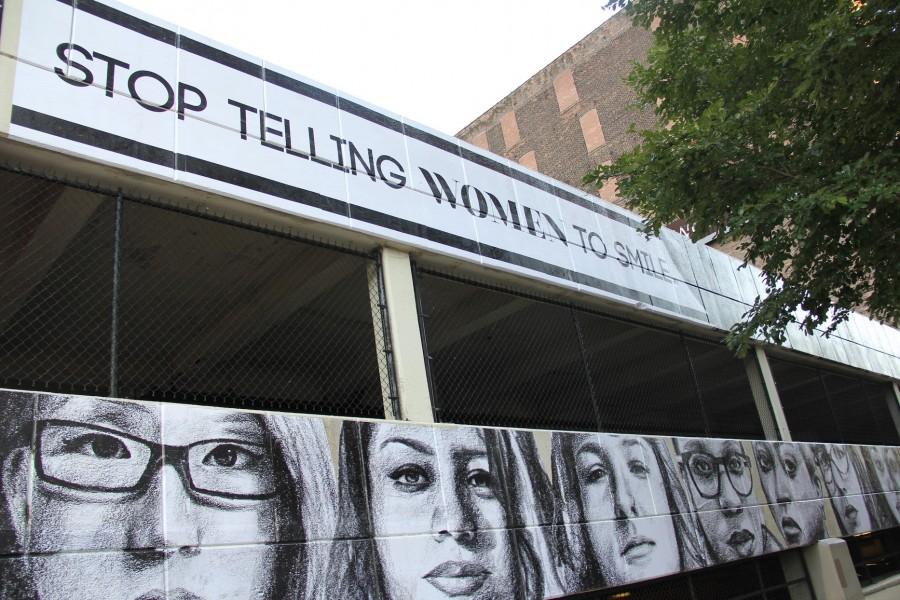The Power of Art: A Mural Says What I Could Not
Tatyana Fazlalizadeh’s latest work about street harassment, a mural of women’s faces and text that reads “Stop Telling Women to Smile,” is displayed at Wabash and 8th street in Chicago.
A controversial new mural went up in downtown Chicago earlier this month. It tells viewers: “Stop telling women to smile.”
Brooklyn-based artist, Tatyana Fazlalizadeh, created the piece to address street harassment of women. As soon as I saw her latest work, displayed near Columbia College Chicago on 8th and Wabash, I was ecstatic.
In 2014, the non-profit organization Stop Street Harassment commissioned a survey of 2,000 people. Of those 2,000 individuals, 65 percent of women stated they had been harassed on the street. On the other hand, 25 percent of men in the survey – particularly those who identified as LGBTQ – reported experiencing street harassment.
“Smile Policing,” as I call it, doesn’t just happen on the street either. The concept of “resting b**ch face” has become a commonplace phrase with its own acronym (RBF). Even women who are positive, fierce role models – like Serena Williams – can’t get away from those who think they’re supposed to present themselves as more euphoric. The Huffington Post reported that after her 2015 US Open quarterfinals win, a male reporter questioned why Williams didn’t really look overjoyed in her press conference. Her answer was honest — she wanted to be in bed so she could wake up early the next day for practice and was tired of being asked the same questions by the other reporters in the room.
I love to smile. However, I hate being told what to do — especially by strangers saying things like:
“Hey baby, why you look so sad?”
“Oh, beautiful princess! Can you please smile for an ugly toad like me?”
“Hey girl. Love that smile.”
Yes, these are all things I’ve heard walking down the street. They’re reasons why I began to hate walking around downtown, waiting for a bus by myself or hanging out around my neighborhood. If you really want my attention, don’t catcall me. I will not respect you for it. In fact, my reaction is typically the opposite because when I don’t do what’s requested – i.e. smile – I worry about what’s going to come next.
I’ve been followed. A taxi driver once did a U-Turn and followed me down a block going the wrong way down the street to try to get me into his cab.
I’ve been cursed out. “Stuck up [insert derogatory comment here]!”
I’ve been assaulted. There was a particular instance where two guys stayed behind me and kept poking my back for a block while I walked down the street—in broad daylight.
No, those examples don’t make me feel like smiling very much.
At NEIU, it’s been a rather odd occurrence for me to have a run-in of the aforementioned nature. During first week of school, I was feeling a little stressed, so I walked around campus. As I walked down the street, I started trying to think of something happy to brighten my mood.
Naturally, I began to smile. No sooner did that happen did I hear a guy say, “That smile is for me, right?” I just kind of rolled my eyes and kept walking. Then, I got angry. I wanted to say, “No, my smile is not for you. My smile is for me.” I couldn’t say that though. There are a lot of reasons why, namely that I wanted to avoid confrontation and the best way for me to do that was to keep walking.
The most unfortunate part of these types of situations is they take something beautiful — a smile — and turn it into something dangerous, something to be ashamed of, something that gets patrolled. What I do or don’t do is no one else’s business. That should be respected.
So thank you, Tatyana Fazlalizadeh, for publicly saying what I could not. I hope that everyone takes notice.
Your donation will support the student journalists of Northeastern Illinois University's The Independent, either in writers' payment, additional supplies and other items of note. Your contribution will allow us to purchase additional equipment for writers/photographers/illustrators and cover our annual website hosting costs.





